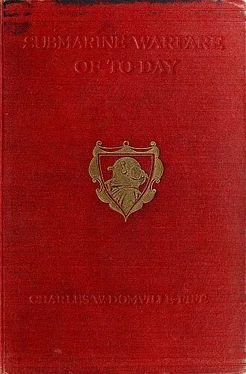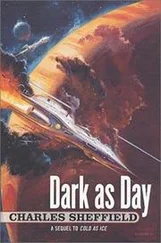CHAPTER XXIV
Mysteries of the Great Sea Wastes
The piratical warfare of German submarines produced many sea mysteries. Some were solved after the lapse of months and even years, while others will, in all probability, remain unknown until the sea gives up its dead.
Among the latter may be numbered the curious discovery in the North Atlantic of a nameless sailing ship, without cargo, identifying papers or crew, but sound from truck to kelson, and with her two life-boats stowed neatly inboard and a half-finished meal on the cabin table. Experts examined this vessel when brought into port, but so far have been utterly unable to offer any solution or discover any clue, beyond the fact that she was built and fitted out in some American port and carried an unusually large crew.
Another similar mystery was the disappearance of a French vessel while on a voyage to New Orleans and the discovery eleven months afterwards that she had called for water and food at a small port on the Pacific coast of South America. No further trace has so far come to light, nor the reason for her changing course and rounding Cape Horn.
A mystery which remains a mystery to the end of the chapter is likely to be irritating to the imaginative mind, but to the following occurrence there came a solution after the lapse of a few weeks.
The Spectre of the Goodwins
It was a pitch-black night, with fine rain driving up from the south-west. The summer gale which had raged for the past twenty-four hours had blown itself out, and although the steep seas still retained their night-caps, the wind came only in fitful gusts. Away to starboard an indistinct blur of white foam stretched athwart the sea and the dull roar from the maelstrom of the Goodwins rolled across the miles of intervening water.
The armed trawler Curlew bravely shouldered her way through each green comber as it rose to meet her, lurching over the seas in a smother of spray. Oilskinned figures moved warily along the life-lines, for when a wave struck her tons of water swept across her slanting decks, submerging the bulwarks and causing the sturdy ship to groan and tremble from stem to stern.
In the little bridge-house the dim light from the binnacle shone on the hard wet face of the commanding officer, who watched the seas as they rose up ahead, giving directions to the man at the wheel, and all the while keeping a watchful eye on the distant blur of foam covering the treacherous shoals.
Few except sailormen can realise the dangers and anxieties of navigation in times of war. The absence not only of the warning lights which in days of peace flash their signals far out over the seas, marking the innumerable dangers which lie along treacherous coasts, but also of warships and merchantmen rushing through the night with not even the flicker from a port-hole to denote their coming—perhaps at a speed of nearly three-quarters of a mile a minute; a second’s indecision on the part of the brain and nerve directing each ship, a momentary forgetfulness of that elusive “right thing to do”—some second danger to attract a flash of attention from the first—even a blinding cloud of spray at the psychological moment and, well, two more ships have gone, with perhaps hundreds of lives. Yet these things but seldom happened, and the reason was that all that tireless energy, skill and nerve could do was done on the sea in those years of storm and stress.
Some two hours later, and just before dawn broke over the tumbling sea, an exceptionally heavy wave struck the trawler full on the port-bow. The hammer-like blows of the water as it poured on board and struck the base of the wheel-house and superstructure momentarily drowned all other sound. When the air had cleared of flying spume a big black hull loomed out of the darkness ahead and seemed suddenly to grow to an immense size, towering high above the trawler’s forecastle-head. A blast on the whistle, a sharp order and the trawler swung off to starboard, with the great black mass perilously near. It was a close shave, and the watch held their breath while waiting for the crash and shock which for a brief second seemed inevitable.
There was no time for action or signal. The great ship slid past like some black phantom framed in the white of flying scud. It faded into the misty darkness of sea and sky almost as quickly as it had appeared, and, curiously, no sound of throbbing engines accompanied its passage.
It took the captain of the patrol but a minute to make up his mind what to do. He gave a quick order to the helmsman and a warning shout to the watch below on deck. The little ship, as she came about, lurched into the trough of a sea and rose shivering from end to end. The next moment an avalanche of white and green water poured over her, flooding the decks and sending clouds of spray high over the funnel and masts. Then commenced an exciting chase, with the seas racing up astern and all eyes trying to penetrate the darkness ahead.
The faint misty light of a new day had brightened the eastern horizon before the mysterious ship again loomed up ahead. The heavy sea still running made it difficult, however, to distinguish any national or local characteristics which might give a clue to her identity or intentions, and the suspense was keen.
The two guns of the patrol vessel were manned, and a three-flag signal fluttered from the jumper-stay but received no immediate reply from the ship ahead. Then, after a few minutes’ pause, during which time the trawler manœuvred for the advantage of the light from the breaking dawn, a yellow flash belched from her side and a shell ricochetted off the water just ahead of the mysterious steamer. Still there was no response; but it could now be plainly seen that the engines were not working and that she was drifting before the wind and sea.
Was it merely a ruse de guerre to gain the advantage in the event of an attack, or was she a vessel disabled by the storm which had raged during the past forty-eight hours? Neither of these suppositions, however, satisfactorily explained the total disregard of signals and the warning shot which had been fired across her bows.
Again a line of flags were hoisted on the trawler’s halyards, this time a well-known signal from the International Code , but still no notice was taken of the peremptory order it conveyed.
After the chase had been on for over an hour another shot was fired from the trawler. The report echoed across the still boisterous sea and the splash of the shell just cleared the ship’s bow. Still there was no response, and the trawler’s course was altered so that she would soon close in on her quarry. As the light increased it was seen that a stout wire hawser was trailing in the water from the starboard bow, and suspicion of some new evidence of sea kultur increased. When the range had closed to about 1000 yards she slowly swung round until almost broadside-on to the trawler, whose guns instantly opened fire in earnest. The third shell struck the large wheel-house of the mystery ship, demolishing it completely. When it became evident that the fire was not going to be returned, the guns of the trawler again ceased, and the two vessels drew close to each other. A partly defaced name, which was rendered indecipherable by the splash of the seas as they struck the counter, could be distinguished with the aid of binoculars in the quickening light of early morning, but neither officers nor crew could be seen, the bridge and decks appearing deserted.
Not to be misled by this ruse, however—for on similar occasions ships had been blown to pieces at close range by concealed batteries—the Curlew approached cautiously, bows-on, offering the smallest possible target, and with her guns trained on the quarry. This sea-stalking is nervy work and must be played slowly. Twice the trawler circled round the mysterious ship, and the sun had mounted high, penetrating the banks of cloud which scudded across the summer sky and tingeing the still boisterous sea with flecks of golden light, before it was considered safe to relax all precautions. Even then the sea prevented any attempt being made to board the curious craft, and for six hours the trawler clung to the heels of her quarry, which was rapidly drifting far out into the North Sea.
Читать дальше












